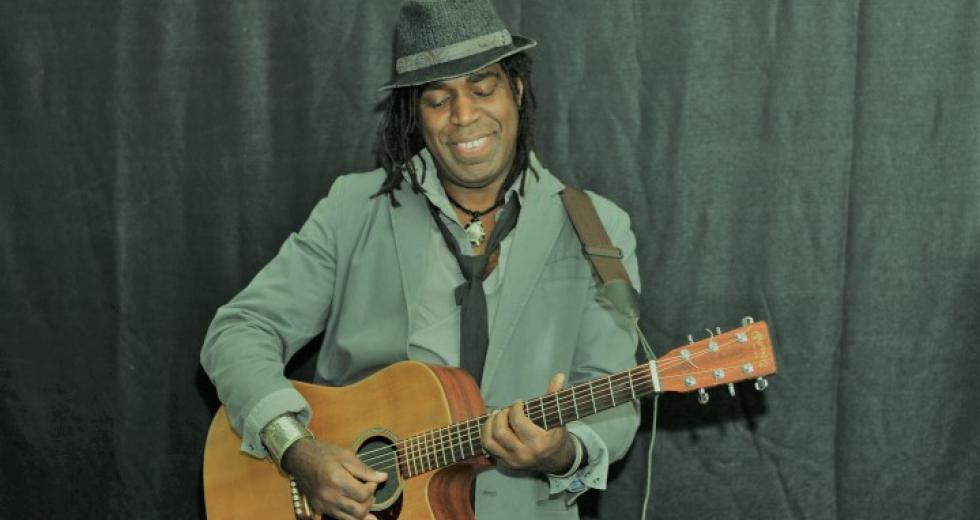Musician Clemón Charles was born in Barbados, where he says he discovered his passion for the guitar when he was 9, and moved to Sacramento in 1988. He estimates he has performed hundreds of live shows in his career. One of the highlights, says Clemón, 56, was playing his guitar and singing “The Star Spangled Banner” before a San Francisco Giants game at Oracle Park in 2018.
Clemón — the name he goes by professionally — has performed in a wide variety of venues in the Sacramento region, including Harlow’s Restaurant & Nightclub, Ace of Spades and the Crocker Art Museum in Sacramento, and Wise Villa Winery in Lincoln. He’s also performed at numerous charity events, including the Black & White Gala: A Ron Cunningham and Carinne Binda Tribute for the Sacramento Ballet in 2018 and the “7 Millionth Meal” celebration dinner for Sacramento Loaves & Fishes in 2015. His first album, “Mad Love,” was released in 2019.
He describes his music as a “melodic infusion of the West Indies, Seattle’s alternative rock and New Orleans jazz.” Comstock’s talked to Clemón in late July about how the COVID-19 pandemic has affected musicians and the live music industry in the Sacramento area. Indoor venues have been closed since March, but some outdoor venues are now offering shows with social distancing protocols in place. After this interview, Clemón booked an outdoor show at House of Oliver wine lounge in Roseville Aug. 20.
The coronavirus pandemic and the order to shut down in March all but ended live music shows. What has that meant to the many musicians who rely on performances to make a living?
Clemón Charles’ music mixes the sound of the West Indies with
Seattle’s alternative rock and New Orleans jazz. (Photo courtesy
of Clemón Charles)
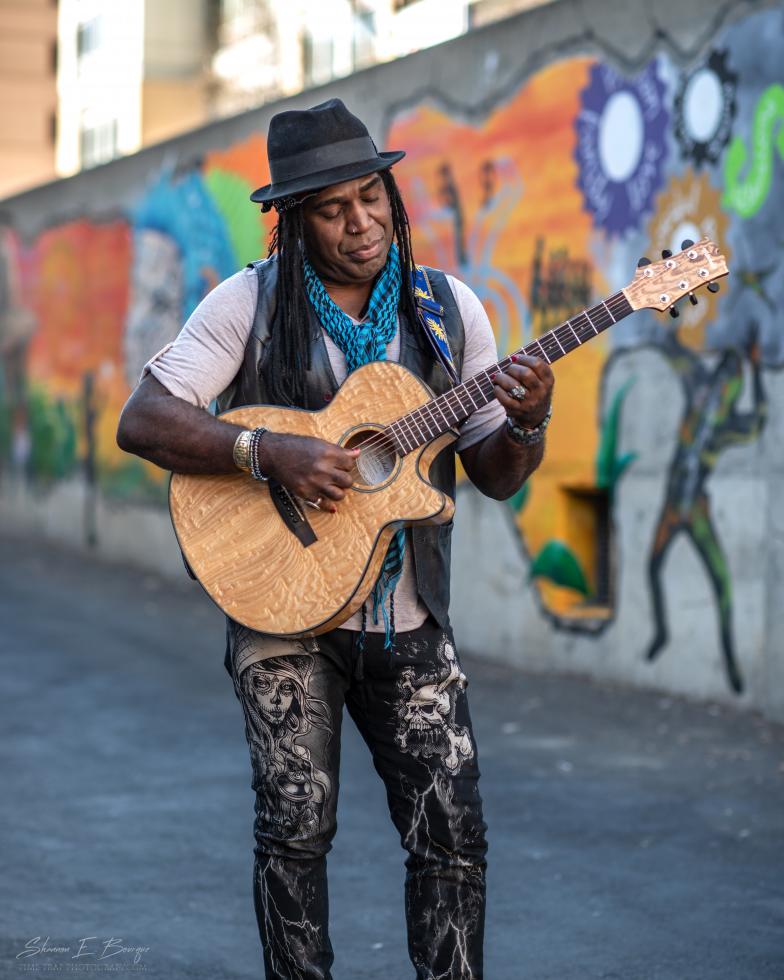
We’re creatives, we actually enjoy creating, and we love that we can get paid to create and bring happiness to people. Musicians are spiritual leaders. … My mom told me the other day that without music, life wouldn’t make any sense at all, because it’s a thing that binds us together. Some of us depend on it for a living. … It’s hard because it’s a passion, and it’s your livelihood, so you’re caught, you’re stuck. In my case, I (played some Zoom shows) for free because everything I had had basically been dropped or been canceled, so I would do some free shows, some for love or a cause. I see what the music brings to people when I perform.
My band did a show at Harlow’s (before the shutdown), and I did one with Kitty O’Neal and her band, Skyler’s Pool (the March 9 show at the Side Door in Sacramento benefited the Food Literacy Center), and, then, that was the last show, then everything pretty much just dropped. … Then COVID hit and everything I had planned went away.
What are you and other musicians doing to satisfy your creative urges — but also to make money? What’s it like performing via Zoom and other videoconferencing applications?
Well, I’ve been writing my screenplay, “The Devil Take the Hindmost,” and my musical play, called “Enlèvement.” Performing using Zoom is not the greatest thing, though I can say it’s better than nothing. I recently tried another app (Twitch) where the sound quality seemed to work much better, so I will be looking into using that app going forward. …
As far as making money, yes, the online shows have brought some money, but there are not nearly enough of them to support a working musician. I always tell musicians, if you’re going to do a show online, try to give them the best experience you can online. Get the right equipment, if you can, or borrow it. Because if they are paying for it, you want them to give them a good experience, as much as you can.
I’ve done some private ones, really cool private ones, in Seattle (online for a real estate group). I’ll tell you, the good thing about online, though, is you can actually play anywhere in the world now … you can do shows anywhere.
With some venues now offering live music in outdoor settings — such as Swabbies on the River in Sacramento — how do you and most musicians you know feel about live shows during the pandemic, and what’s the experience like for musicians?
Yes, doing live shows during a pandemic is a little daunting. For myself it’s a cost benefit. Should I risk doing a show for not much money when I might contract COVID? If the venue can guarantee good social distancing and enforce mask rules, that would go far as an enticement to play. Again, some intimacy will be lost, but I think it is a fair trade. We don’t always get perfect conditions when working for our living and COVID just upped that ante.
There are others, like the Pink Martini (Rocklin), House of Oliver (Roseville) and Wildwood (Fair Oaks), doing live music (outdoors). It’s not the same. I remember playing House of Blues in San Diego (indoors last year) and it was like, I could do this all day, people were getting into it, it was a blast. That energy was so important.
I get a lot of people asking me to come and play, and I turn down a lot of stuff because of COVID, because first of all there has to be a protocol. If you’re going to play anywhere, you have to make sure there’s a protocol to keep you safe, as a musician, and your clients, keep them safe too. There are some places that guarantee that there’s a social distance requirement. … I always do a site survey before I would go out to do a show, and if I see it’s challenging, then I would turn it down. I don’t care how much it is, honestly, I would just turn it down. (But) for some musicians, it’s their next meal sometimes, and it’s very challenging. Then you have to figure out, well, take a risk or, you know, the money — compromise my health (for) the money.
The indoor stuff I will never do; if there’s a protocol for outside, then I will do it. If I can have at least 10 feet, and the (venue) has to be a certain size as well. It’s very challenging. It puts me in a position where, boy, like everyone, I totally need the money as well, but I think my health is way more important.
It isn’t just musicians who have been affected — what about those who used to regularly go on the road in supporting roles for concert bands?
Yes, those people are hit just as hard. Anyone in any kind of job that involves people in close contact, whether direct or ancillary support, has been negatively affected. I have people that I pay to assist me when I play out. And while I don’t think I was their main source of income, still that was money they probably relied on from time to time that isn’t coming in. I imagine those who were full-time will be worse off. I have friends who produce music festivals, like Outside Lands (San Francisco), Electric Forest (Rothbury, Michigan) and Bonnaroo (Manchester, Tennessee), and they are off the road and becoming restless.
The Sacramento area music scene was robust, with a large number of venues across the region and many different genres from which to select. What do you see happening when the crisis passes? How cautious will musicians be performing live again, especially at indoor venues?
I’m not sure. That is a great question. When the states opened up business again, it seemed to me that folks just flooded out of their houses, the gates had opened, and the race was on. I think there will be a huge incentive to get back to work as quickly as possible, and it seems a fair guess that many people will be excited to get back out performing again if they are convinced that the epidemic is truly over. However, I don’t think this can be truly known — as more and more time passes and people start having to adjust their lives, they get used to a new normal. So who knows what will actually happen? My personal hope is that Sacramento will once again be a thriving music scene.
I see the industry recovering. Great musicians come out of Sacramento. … If you’re going to play anywhere, play Sacramento, because people here love live music, they love musicians. And I think we will thrive again. I see it bouncing back up again. It will be a slow one, but I believe it will happen, that’s for sure.
—
Stay up to date on the effects of the coronavirus on people and business in the Capital Region: Subscribe to the Comstock’s newsletter today.
Recommended For You
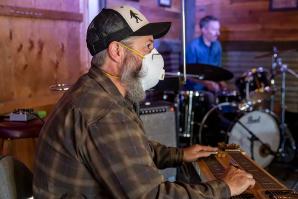
Sign of the Times
Sacramento band streams benefit show instead of playing before live audience
The alt-country band JonEmery & the Unconventionals performed a set on Facebook to benefit the 10 employees of the Torch Club, where the band had been scheduled to play on March 25.
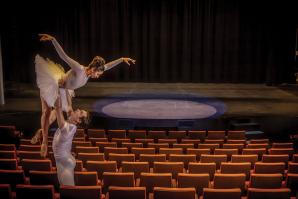
Out of the Spotlight
The coronavirus pandemic has closed the curtain on the Capital Region’s performing arts, but leaders are hopeful about the future
Last year was a strong one for the performing arts in the region, and 2020 was building on that success, which has led to hope from some local arts leaders that this progress will continue despite the unprecedented shutdown.
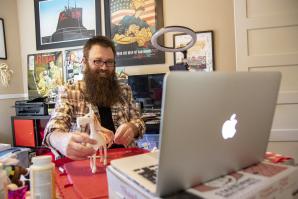
Photo Essay: The Arts in Isolation
How Sacramento-area artists and art businesses are creating content and engaging with the community during the pandemic
Many organizations and artists around the Capital Region, including dancers, musicians and comedians, are getting creative with technology to continue sharing their work.
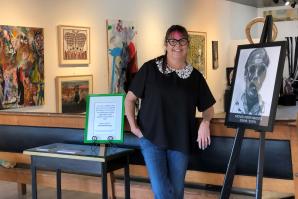
Creativity in Quarantine
Artists and art gallery owners in the Capital Region are finding ways to connect to the public while in isolation
As county and state orders compelled most people to remain at home, the Sacramento art world took a huge hit. However, creativity has continued to flourish in quarantine.



